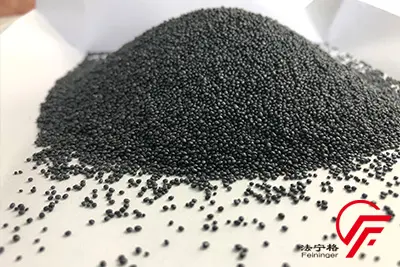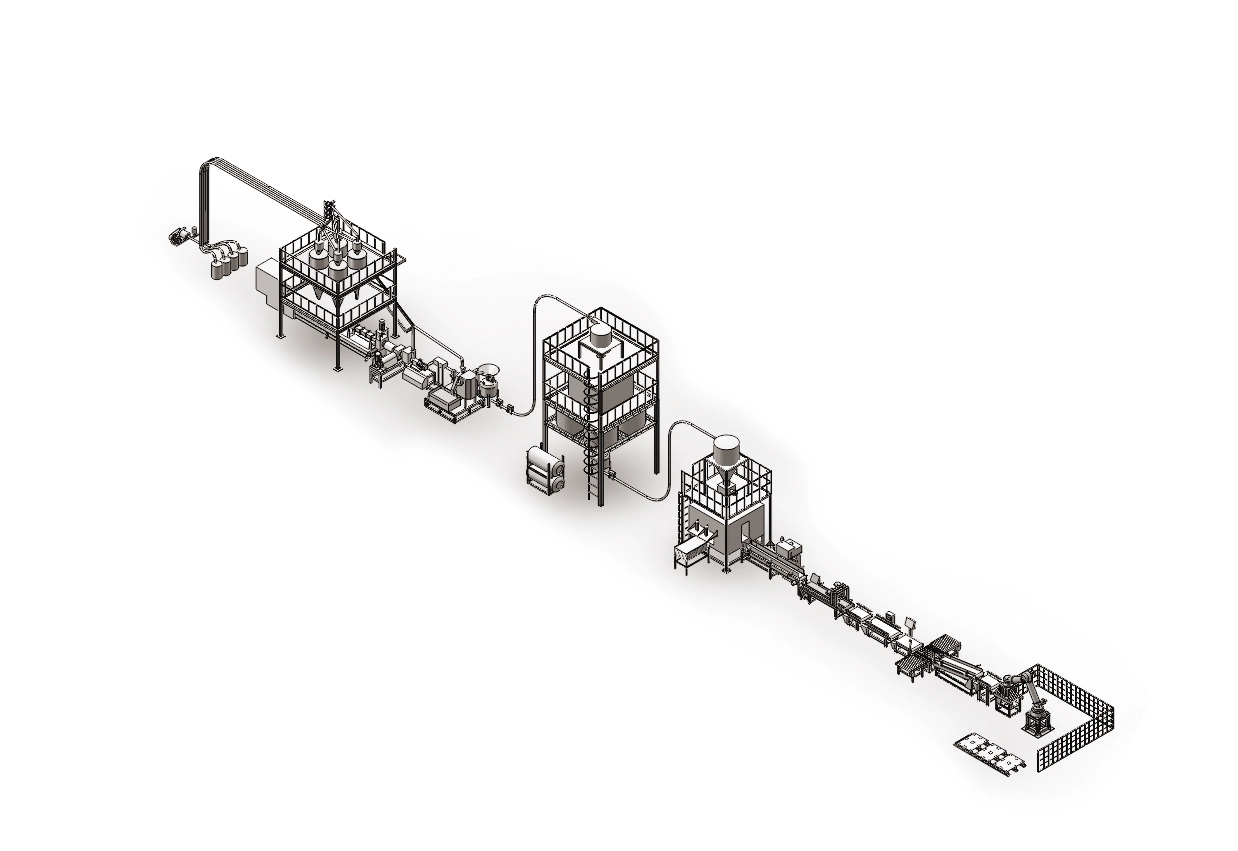Expanded Polystyrene (EPS) has become one of the most widely used materials in modern industry, known for its lightweight, insulating, and shock-absorbing properties. Whether in packaging, construction, or automotive applications, EPS has proven to be versatile and cost-effective. A critical process behind the production of EPS materials is EPS particle extrusion, which transforms raw polystyrene into usable expanded granules.
This article provides a comprehensive overview of the EPS particle extrusion process, the properties of EPS particles, the applications of expanded polystyrene granules, and the latest innovations in the industry. It also highlights one of the leading manufacturers in the sector—Feininger—for businesses looking to invest in high-quality extrusion equipment.

1. Understanding EPS Particles
Before diving into the extrusion process, it is essential to understand what eps particles are.
EPS particles, also known as polystyrene beads, are small thermoplastic pellets produced from styrene monomers. In their initial state, these particles are hard, glassy, and transparent. When exposed to heat and a blowing agent such as pentane, the beads expand to form lightweight foam structures.
The difference between eps particles and expanded polystyrene granules lies in this transformation. EPS particles are the raw material, while expanded polystyrene granules are the processed, foamed version that is widely used in insulation panels, packaging materials, and molded components.
Key properties of EPS particles include:
Low density compared to other plastics
Ability to expand up to 40 times their original volume
Excellent thermal insulation and shock absorption
Resistance to moisture, making them suitable for construction and packaging
2. The EPS Particle Extrusion Process
The process of EPS particle extrusion involves several stages that transform raw polystyrene beads into expanded granules with the desired size, density, and performance.

Step 1: Raw Material Preparation
Step 2: Heating and Extrusion
The particles are fed into an extruder, where controlled heat softens the material.
Under pressure, the material is forced through a die, shaping it into a continuous form.
Step 3: Expansion and Foaming
As the EPS material exits the extruder, rapid pressure release and heat cause the beads to expand.
The cells inside each particle fill with air, creating lightweight expanded polystyrene granules.
Step 4: Cooling and Cutting
The foamed material is stabilized through cooling.
It is then cut into granules or shaped into blocks, depending on end-use applications.
Equipment in EPS particle extrusion includes pre-expanders, extruders, cutters, and molding systems. Modern extrusion lines integrate automation for better control of density, uniformity, and quality.
3. Advantages of EPS Particle Extrusion
The popularity of EPS particle extrusion comes from its efficiency and cost-effectiveness. Some of the main advantages include:
High Production Efficiency: Suitable for mass production in packaging and construction industries.
Lightweight Products: EPS foam is easy to transport and handle, reducing logistics costs.
Excellent Thermal Insulation: Widely used in construction for energy-efficient buildings.
Shock Absorption: Expanded polystyrene granules provide superior cushioning for fragile goods.
Cost-Effectiveness: The raw material is relatively inexpensive compared to alternative foams.
Design Flexibility: EPS can be molded into various shapes and sizes for diverse applications.
4. Applications of Expanded Polystyrene Granules
The versatility of expanded polystyrene granules has made them indispensable in multiple industries.
1. Packaging Industry
Used for protective packaging of electronics, appliances, and delicate goods.
Food packaging, such as trays, cups, and containers.
2. Construction Industry
Insulation panels for walls, roofs, and floors.
Lightweight concrete fillers.
Soundproofing applications in modern buildings.
3. Automotive Industry
Shock-absorbing parts in vehicles.
Noise reduction components.
Lightweight design elements for fuel efficiency.
4. Other Applications
Disposable consumer products such as cups and plates.
Decorative materials for exhibitions and displays.
Model-making and art installations.
The diversity of applications continues to expand as new innovations in EPS processing emerge.
5. Environmental and Recycling Considerations
While EPS is valued for its functionality, it is also criticized for environmental concerns. Fortunately, advancements in recycling and sustainable processing are helping address these issues.
Recycling EPS Particles
EPS waste can be ground back into particles and re-extruded into new products.
Compaction systems reduce the volume of EPS waste for easier transportation.
Advanced recycling processes can convert EPS into polystyrene resin for reuse.
Sustainable Innovations
Use of eco-friendly blowing agents with lower environmental impact.
Development of biodegradable alternatives and improved collection systems.
Energy-efficient extrusion equipment that minimizes power consumption.
The EPS industry is moving towards a circular economy where materials are reused instead of discarded, making EPS particle extrusion more sustainable.
6. Recommended Manufacturer: Feininger
For companies seeking reliable extrusion equipment and solutions, Feininger stands out as a leading manufacturer.
About Feininger
With years of experience in EPS and XPS (extruded polystyrene) equipment, Feininger has become a trusted name in the field.
The company specializes in designing and producing EPS extrusion lines, pre-expansion systems, cutting machines, and insulation material solutions.
Key Strengths of Feininger:
Advanced Technology: Feininger integrates automation and precision control into EPS particle extrusion systems, ensuring consistent quality.
Energy Efficiency: Their equipment is designed to reduce energy consumption, lowering operational costs.
Sustainability Focus: Feininger actively works on developing eco-friendly solutions for recycling and reusing EPS materials.
Comprehensive Product Range: From EPS pre-expanders to complete extrusion lines, Feininger provides turnkey solutions tailored to client needs.
Businesses investing in EPS particle extrusion can benefit from Feininger’s expertise and global service support, making it an ideal partner for sustainable and profitable production.
7. Future Trends in EPS Particle Extrusion
The future of EPS extrusion is shaped by technological innovations and growing market demand.
Automation and Smart Manufacturing – Digital monitoring and AI-based quality control will ensure higher precision.
Eco-Friendly Materials – Research into biodegradable alternatives and green additives will expand.
Recycling Integration – More extrusion systems will include built-in recycling modules.
Market Expansion – Packaging and construction industries will continue driving demand for expanded polystyrene granules worldwide.
These trends ensure that EPS will remain an essential material in global industries.
8. Conclusion
EPS particle extrusion is a critical process that transforms raw eps particles into functional expanded polystyrene granules used across industries. With advantages such as lightweight properties, excellent insulation, and cost-effectiveness, EPS continues to dominate packaging, construction, and automotive applications.
At the same time, sustainability and recycling efforts are reshaping the future of the EPS industry. Manufacturers like Feininger are leading this transformation by providing advanced, energy-efficient extrusion equipment and innovative solutions.
For businesses looking to optimize their production of EPS materials, investing in modern extrusion technology is not just a competitive advantage but a necessity for long-term growth.

 Español
Español Pусский
Pусский
